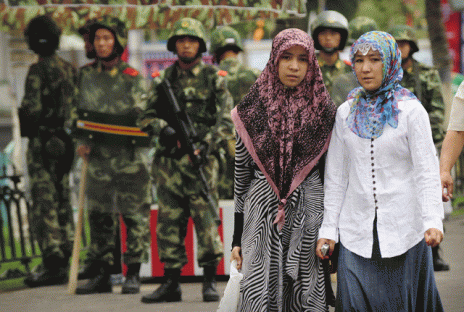Internment Camps Still Exist: U.S. Declares Genocide

Photo: Word Press – Creative Commons
Uighurs in China are being subjected to human rights abuses and internment.
February 5, 2021
Many students, reading books such as Farewell to Manzanar, might think that internment camps are a thing of the past. These same students might be shocked to know of the current imprisonment of Uighurs in China.
Uighurs—alternatively spelled Uygers, Uigurs, or the Uyghers—are a Turkic ethnic group affiliated with the region of Central and East Asia. Classified as one of China’s 55 officially recognized ethnic minorities, they are considered native to the Xinjiang Uighur Autonomous Region of Northwest China. There are currently about 11 million Uighurs in Xinjiang, and they speak various dialects of Standard Xinjiang and Standard Soviet, the two languages of the region divided by territory. After its annexation by China in 1949, Xinjiang has been under its control and many Uighurs continue to identify the region by its earlier name, East Turkestan.
Since 2017, at least one million Uighurs have been found to be interned in more than 85 camps in Xinjiang despite the Chinese government’s initial denial of their existence. However, after a leakage of camp construction images, the government recognized what officials euphemistically called “re-education centers.” It further claimed that the Uighurs were receiving “vocational training” to learn about Chinese culture and history to fend off terrorism from Uighur separatist movements. Yet, it is evident that the treatment of the Uighurs is far from “re-education.”
According to the United Nations, a genocide is defined as the “intent to destroy, in whole or in part, a national, ethnical, racial or religious group.” On January 2021, the United States Department of State officially declared that the Chinese government was committing genocide and further crimes against humanity. The Biden Administration agreed that mass internment, forced labor, and sterilization of Uighur women were constituents of a genocide. Furthermore, Former Secretary of State Mike Pompeo declared, “I believe this genocide is ongoing, and that we are witnessing the systematic attempt to destroy Uighurs by the Chinese party-state,” further stating that Chinese officials were “engaged in the forced assimilation and eventual erasure of a vulnerable ethnic and religious minority group.”
While the United States is currently the only country to use the term “genocide,” Rushan Abbas, an activist and leader of the Campaign for Uyghurs, says the declaration is only being rightfully labeled as what it is, stating that “what is happening in China is active genocide, and we have been crying out loud for years. I have been being very vocal and calling this as a genocide for past two years.”
The Chinese Embassy in Washington in January subsequently stated that “the so-called genocide in Xinjiang is simply a lie.” Its explanation for this statement was that the overall population of ethnic minorities in Xinjiang (and therefore that of Uighurs) had augmented in the past two years. To further defend its actions, the government stated that its policies in Xinjiang were part of a fight against “terrorism and extremism,” and “these measures have proved to well service Xinjiang’s situation and produced notable results.”
Despite the Chinese government’s claims that Uighurs are part of a “labor transfer program” and are being sent to factories to alleviate poverty and receive well-paying jobs, former detainees state that the Uighurs detained inside the camps are constantly victim to “mental and physical torture.” Crematoriums are being built next to the camps, and more than 80 global brands such as Apple, BMW, Gap, and Nike utilize products made by detained Uighurs, who are also subject to constant indoctrination in Chinese Communist Party ideologies.
Even the Uighurs not in camps are constantly being surveilled, their daily activities monitored 24 hours a day. In addition, Uighur women are victim to forced sterilization and abortions, in addition to forced marriage with men of the Han Chinese ethnicity, China’s largest ethnic group. Should a Uighur woman refuse, she is tagged as a terrorist.
A grave problem continues to lie in the fact that this internment and human rights abuses of Uighurs are not getting as much attention as they should. Although the U.S. government is starting to closely survey Uighurs and ban imports of crops from the Uighur region, this is only a start. The public must acknowledge that internment camps and genocide are not just the subjects of books, and that the current situation of the Uighur Muslims is dire for all of humanity.

















































































































































